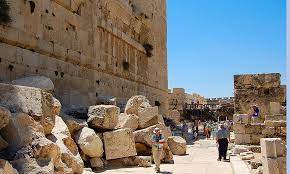This Sunday, the lectionary invites us to ponder the gospel passage which many translations title “Peter confesses Jesus as the Christ” (Matthew 16:13-20).
The passage features Jesus and Peter and “the disciples,” the twelve members of Jesus’ inner circle. It tells of a conversation between them. By this time, Jesus has performed miraculous healings, exorcisms, and feedings; chastised and outwitted the authorities; stilled a storm, walked on water; delivered lots of sermons.
The conversation begins with “who do people say that the Son of Man is?” The twelve name John Baptist, Elijah, Jeremiah, other prophets. Jesus then asks: “who do you [twelve] say that I am?”
Peter answers: “You are the Christ, the Son of the living God.” Jesus commends him, gives him a new name, “Rock,” says he’ll build his church on him.
Jesus says “the gates of [Hades]” will not prevail against the church. He adds: “I will give you the keys of the kingdom of heaven, and whatever you bind on earth shall be bound in heaven, and whatever you loose on earth shall be loosed in heaven” (verse 19). Then he tells the twelve not to tell anyone that he’s the Christ (verse 20).
Before I consider why Jesus reminded people of Jeremiah, I’ll touch briefly on four other things in the passage.
First, some call Matthew “the ecclesiastical gospel,” because it uses the word ekklesia (“church”). The designation is unsatisfactory because “ecclesiastical” implies “hierarchy” (organizational structure), which is absent from the gospel.
The renaming of Peter is significant. It recalls the renaming of Abram to Abraham, Jacob to Israel, Sarai to Sarah, and so on. But does it follow that Jesus established “the throne of Peter,” with successors?
It does not follow, because ekklesia, as used then, denotes a community, not a hierarchy. Also, other passages teach us that the apostles and prophets are the foundation of the church (e.g., Eph 2:20; Rev 21:14).
Second, does “keys of the kingdom of heaven” mean the church decides who can join the kingdom, decides who’s in and who’s out? If it does, we ask: “which church?” – and get no satisfactory answer. So, it seems best to read “keys to the storehouses of God’s resources.”
Third, “whatever you bind … loose” seems best interpreted as “you’ll be able to discern what behaviour pleases God.” This phrase assigns responsibility to the community’s leaders to make rules for the community (congregation): rules about food, circumcision, rituals, ethical behaviour.
Fourth, the phrase “gates of [Hades] shall not prevail.” The English Standard Version (ESV) uses the word “hell” but in a footnote says the original word is “Hades.” Matthew uses this phrase to tell his readers Jesus anticipated that many who reserved for him alone the title “Lord and God” (against Caesar) would be killed, but the church would survive.
Now I’ll get to my chief interest: why did some people think Jesus was Prophet Jeremiah?[1]
Jeremiah’s inclusion forcefully reminds us of the extent to which Jesus was, like Jeremiah, a wounded, despised, rejected “prophet of doom.”
Like Jeremiah, Jesus predicted the fall of Judah and the crushing of the seemingly indestructible Temple: recounted in the remainder of Matthew.
Like Jeremiah, Jesus incurred fierce hostility.
Like Jeremiah, Jesus directly confronted the religious and political leaders.
Notice the echo of Jeremiah in Jesus pathos and in his prophetic words:
Jeremiah 22:5 … this house shall become a desolation.
Matthew 23:37-38 37 “O Jerusalem, Jerusalem, the city that kills the prophets and stones those who are sent to it! How often would I have gathered your children together as a hen gathers her brood under her wings, and you would not! See, your house is left to you desolate.
Jesus of course was more than any of the prophets. Only one label fit him – the cryptic label he chose for himself, the label “Son of Man,” a label which made people wonder who he might be, really.
Remember Jesus’ words about himself to the Pharisees who criticised him when his disciples, on a Sabbath, plucked grains of corn and ate them to satisfy their hunger: “Something greater than the Temple is here.” (Matthew 12:6)
That day, for the twelve, the label “Son of Man” was cryptic no more. The code was broken: Jesus is the Messiah, the Christ, the anointed one, the Son of the living God. But Jesus tells them to keep it to themselves. Why?
Because they still didn’t get what it means – Matthew immediately tells us Peter so “didn’t get it” that Jesus said to him: “Get behind me, Satan!”
Peace be with you.
[1] Since Jesus and the New Testament writers quote Prophet Isaiah so much, why isn’t Isaiah in the list? Matthew may have wished to keep the attention on Jeremiah. Also, he gives much attention to Isaiah in the rest of his Gospel.
To learn more about Rama, click here.



Pingback: Caught between a sentence now and in the future? – Bangsar Lutheran Church